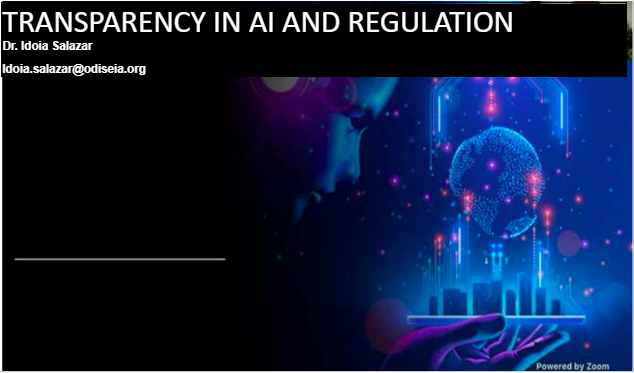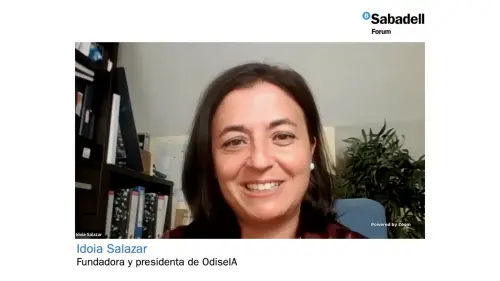That it is a threat to humanity, that it is a tool that discriminates, that it should be stopped. For the chairwoman of OdiseIA, Idoia Salazar, artificial intelligence (AI) stirs up a lot of prejudice and mistrust due to lack of knowledge. In her opinion, the key is in its use and, therefore, in the people who develop it. The responsibility and ethics of AI lie with humans, not machines.
This is the view expressed by this expert in the last session of the Trustworthy Artificial Intelligence series of talks with the title 'Transparency in algorithms in artificial intelligence' organised by the Directorate of Analytics and Artificial Intelligence, within the framework of the Sabadell Forum.
The arrival of the tractor to plough the land was a major leap forward in agriculture. Its emergence improved the work of farmers. Today no one doubts its positive impact. Idoia Salazar posited this example to put it at the level of the implementation of AI and the benefits it entails. "AI is a tool like the tractor in the field, a tool that has to help us do things better," he said.
The positioning of some renowned experts in AI warning of the negative impact of its use on our lives contrasts with the vision of Idoia Salazar, who maintains that slowing down its development is impossible. "It would be unethical not to use AI today. Putting the brakes on it is unrealistic, because we are talking about a tremendously useful, cheap and easy-to-use tool. The chairwoman of OdiseIA added, "What must be done is to advance in parallel in the application of regulations and ethical principles". It would be, in her opinion, the way to attenuate or assuage fears and the reigning scepticism.
From her point of view, it is a must for companies, public and private bodies to use AI at all levels, as it is a fundamental element to manage data, given the large amount of it that is currently handled. In addition, the emergence of Generative AI – especially ChatGPT and DALL-E, among other models – has meant a change of era dominated by a high-impact technology. For this reason, she claimed that the use of artificial intelligence "is not an option, but a duty" while claiming that there is a high level of responsibility and ethics in its implementation.

Combatting mistrust and ignorance
Precisely to combat the mistrust and ignorance that exists with regard to AI, she asked companies and organisations to make an extra effort when it comes to explaining and being transparent in the processes of use. "Data transparency and AI algorithms involve the ability to know what data is used, how it is used, who uses it, what they use it for, and how it is reached, based on the data, to make decisions that affect people's lives," she explained.
The chairwoman of OdiseIA expressed her disagreement with those who claim that it is necessary to compete with AI to try to minimise its incidence. "Competing with a machine is ridiculous, just as it would be if man wanted to compete with a racehorse to show who is faster," she said. She also distanced herself from those who call for a ban on AI: "It is not a question of prohibiting, but of using technology well and regulating its use. We have to make an AI that puts people at the centre". And she highlighted the work being done by the European Commission to establish a regulation that contributes to increasing confidence among consumers. Her presentation ended with a decisive request: there is a need to make a drastic change in education models because in her opinion it is necessary to "provide an education that promotes and fosters people’s critical spirit, as it is the best way to avoid a manipulated society".

Can humankind be trusted?
Experts such as Sam Altman, CEO of OpenAI (creator of ChatGPT), and Demis Hassabis, CEO of Google DeepMind, warn that AI could cause the extinction of humanity. According to the words of Idoia Salazar at Sabadell Forum, the crux of the matter is to know what generates more fear: the scope of AI or the will or intentionality of people. When the dichotomy arises between those who advocate the development of trustworthy or responsible AI and those who predict dire prospects based on its potential, perhaps it is necessary to review the history of humanity to find the answers to the key question: Can we trust the human race to face the future with responsibility and trust?